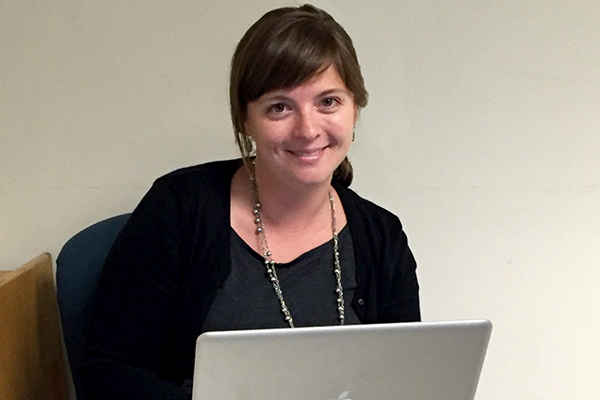
Researching disabilities studies
Doctoral researcher examines how students interpret disabilities studies classes
11:23 a.m., Oct. 15, 2015--From cultural and ethnic differences, to differences in academic and occupational goals, students at the University of Delaware are far from cookie cutter imitations.
Marisa Kofke, a third-year doctoral student in UD’s College of Education and Human Development, wanted to know if students with different majors interpret and internalize information in class differently.
Campus Stories
From graduates, faculty
Doctoral hooding
“I noticed that students in the disabilities studies minor learned new ways to think about disability issues as they take their courses. I wanted to know if there are differences in the way they understood and applied that knowledge,” said Kofke.
UD’s Center for the Study of Diversity provided Kofke a one-year, $1,145 grant to study "Undergraduate Student Reflections of Disability: Implications for Postsecondary Pedagogy."
Kofke used the funding to attend a Society for Disabilities Studies conference in Atlanta, knowing it would assist her in the development of her study. People from across the country attended the event, many of whom were not in the disabilities field, nor were they academics.
“I had the opportunity to touch base with the disabilities studies community. It was a fantastic experience,” said Kofke. “I was amazed at how inclusive the event was.”
Armed with a deeper understanding of disabilities studies, Kofke used the information and contacts to formulate a better approach to her study and help her analyze the data.
Kofke is using qualitative methodologies, including informal pre- and post-course questionnaires, student work samples and observations of class discussions in the spring and fall 2015. Her audience ranges from those who are curious about the field to individuals who are interested in pursuing a career in disabilities studies.
The goal of her study is to answer three questions:
- How do undergraduate students make sense of and understand disability while completing this disabilities studies course?
- How do undergraduate students represent disabilities within their specific disciplines and what shifts occur throughout the semester?
- What pedagogical decisions made by the course instructors seem to promote undergraduate students’ development of new understandings of disability?
“The methods used to teach students with disabilities are a critical part of their success. So I included a component to identify which teaching methods used by the course instructors are helping the students with their understanding of disability,” said Kofke.
There has not been a lot of study regarding how students learn in disabilities studies courses at the postsecondary level, so these findings could have an impact on instructors teaching strategies and curriculum. This was important to her, as it integrates her academic background with her career experience.
“I graduated with a bachelor’s degree in early childhood and special education, and later received an autism certificate, as well as a master’s degree in education. After working as a teacher for a few years, I became a behavior specialist consultant working with families inside their homes,” said Kofke. “That experience showed me another side of the coin.”
Kofke presented preliminary findings at the 2015 CEHD Steele Symposium in April, and expects to complete her final analysis by the spring of 2016.
Article by Rebecca Gasperetti
Photo provided by Marisa Kofke








